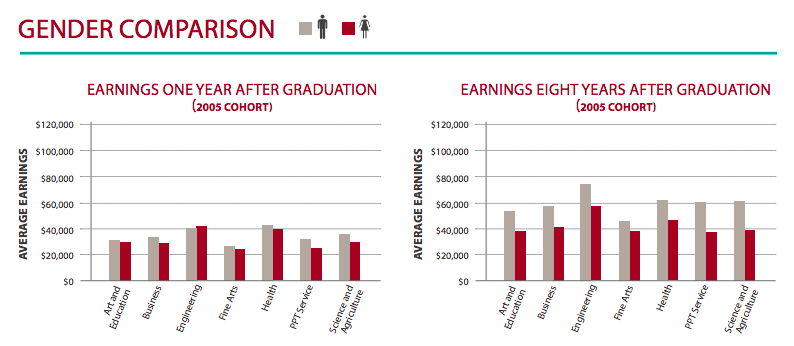It is not necessarily true that majoring in subjects like English, History or Political Science at the undergraduate level will lead you nowhere financially.A new study released by the Education Policy Research Initiative (EPRI), a national research organization based at the University of Ottawa says that it is a myth that post-secondary education no longer carries the value it once did.The study linked records on students from 14 colleges and universities from four provinces with income tax data obtained from Statistics Canada.As it turns out, it is not just graduates with engineering and commerce degrees that end up with well-paying jobs — humanities and social science graduates also end up seeing a substantial increase in their earnings, even though their starting point, salary-wise, might be much lower that those with professional degrees.Aptly titled “Barista or Better? New Evidence on the Earnings of Post-Secondary Education Graduates: A Tax Linkage Approach”, the study shows that the average annual earnings for 2005 bachelor degree graduates was $45,200 for the first year upon graduation, but then steadily rose by a good 66 percent to reach $74,900, just eight years after graduation.Arts and education graduates in particular saw their incomes rise by 40 percent, from $29,400 to $41,500 within eight years of graduation. Science and agriculture graduates might have started out with a salary of $32,400, but eight years later, they seem to earning close to $50,000, a 53 percent increase in income.Graduates of visual and performing arts earned $28,800 upon graduation, but that figure climbed to an acceptable $45,100, within eight years.Of course, the fact still remains that engineering, computer science, mathematics and business graduates still end up having the highest starting salaries, and see the biggest increases in income over time. But the notion that an undergraduate degree, especially in the humanities, will leave you in a job that pays barely above the minimum wage, seems to be quite unsubstantiated. “These figures need to be seen in context,” said Ross Finnie, director of EPRI and lead author of the study. “While it is not easy to come up with a good estimate of what baristas make, or how many graduates are working as baristas, a reasonable approximation might be in the $12 an our range, which yields an annual salary of $22,150.”That figure, Finnie says, is much less that what the average arts graduate starts out, and ends up making.“Those in social sciences and humanities degrees actually do better than what popular understanding would suggest — that was the most interesting and surprising result we got from the study.”Follow Vanmala on Twitter
“These figures need to be seen in context,” said Ross Finnie, director of EPRI and lead author of the study. “While it is not easy to come up with a good estimate of what baristas make, or how many graduates are working as baristas, a reasonable approximation might be in the $12 an our range, which yields an annual salary of $22,150.”That figure, Finnie says, is much less that what the average arts graduate starts out, and ends up making.“Those in social sciences and humanities degrees actually do better than what popular understanding would suggest — that was the most interesting and surprising result we got from the study.”Follow Vanmala on Twitter
Advertisement
Advertisement
